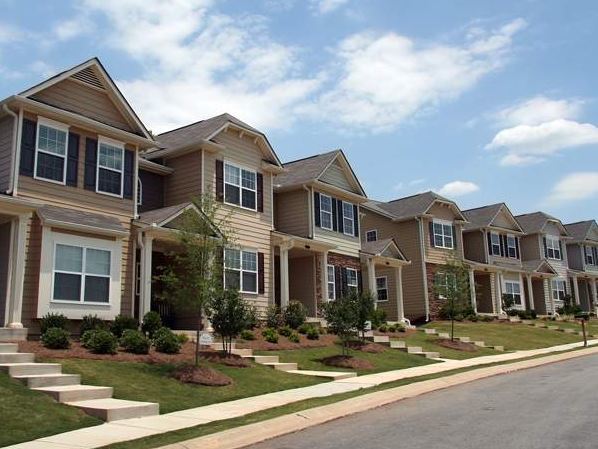Was recently engaged to come investigate a lower level deck that had partially collapsed. The shear attachment at the ledger sheared off with two individuals standing near the patio door. The ledger was attached with concrete nails at several feet OC.
Thankfully the collapse was limited in that the lower level of the deck was only 2' off the ground and the two individuals weren't hurt. I was engaged by the property manager for that address and we decided it was best to do a complete replacement as we found numerous other problems (bad guardrail, 2nd level ledger attachment significantly under strength, main beam undersized, etc). In every way, these decks were built poorly with no adherence to code or even quality craftsmanship taken into account.
The trouble is, this one deck is one of 200 identical decks in this neighborhood.
Following my report, the property manager for this house notified the HOA but was ignored. I followed up with an email and was told the HOA was still controlled by the developer who is also the property manager of the majority of the homes here as well. This developer is also notorious for not following codes and essentially pays for his numerous lawsuits by building new buildings in the area.
Very troubled by the critical nature of the deficiencies in these decks, I reached out to the City inspectors but was told their jurisdiction doesn't extend to this area of the county.
Through a mutual friend, I sent a brief explanation to the County Commission but was also told there was no code enforcement they could offer.
I'm now at a loss for what I am obligated to do (both by code of ethics and a that of a decent person in the knowledge of a bad issue). This concerns me a lot. There are real problems with these decks and it won't be long before a second story portion collapses. And the nature of the neighborhood is such that there are also many families with young children making the burden even greater.
But I'm stuck. The developer is likely to sue me on some frivolous claim if I notify him of anything. But any public notice or such is bound to get noticed by him first. I am not sure it's appropriate to mail a letter to each owner as it seems as though I'm soliciting services. But I'm left with a huge burden to do something to prevent what I am sure will be a bad situation in the future.
Thoughts?
PE, SE
Eastern United States
"If a builder builds a house for someone, and does not construct it properly, and the house which he built falls in and kills its owner, then that builder shall be put to death!"
~Code of Hammurabi
Thankfully the collapse was limited in that the lower level of the deck was only 2' off the ground and the two individuals weren't hurt. I was engaged by the property manager for that address and we decided it was best to do a complete replacement as we found numerous other problems (bad guardrail, 2nd level ledger attachment significantly under strength, main beam undersized, etc). In every way, these decks were built poorly with no adherence to code or even quality craftsmanship taken into account.
The trouble is, this one deck is one of 200 identical decks in this neighborhood.
Following my report, the property manager for this house notified the HOA but was ignored. I followed up with an email and was told the HOA was still controlled by the developer who is also the property manager of the majority of the homes here as well. This developer is also notorious for not following codes and essentially pays for his numerous lawsuits by building new buildings in the area.
Very troubled by the critical nature of the deficiencies in these decks, I reached out to the City inspectors but was told their jurisdiction doesn't extend to this area of the county.
Through a mutual friend, I sent a brief explanation to the County Commission but was also told there was no code enforcement they could offer.
I'm now at a loss for what I am obligated to do (both by code of ethics and a that of a decent person in the knowledge of a bad issue). This concerns me a lot. There are real problems with these decks and it won't be long before a second story portion collapses. And the nature of the neighborhood is such that there are also many families with young children making the burden even greater.
But I'm stuck. The developer is likely to sue me on some frivolous claim if I notify him of anything. But any public notice or such is bound to get noticed by him first. I am not sure it's appropriate to mail a letter to each owner as it seems as though I'm soliciting services. But I'm left with a huge burden to do something to prevent what I am sure will be a bad situation in the future.
Thoughts?
PE, SE
Eastern United States
"If a builder builds a house for someone, and does not construct it properly, and the house which he built falls in and kills its owner, then that builder shall be put to death!"
~Code of Hammurabi

